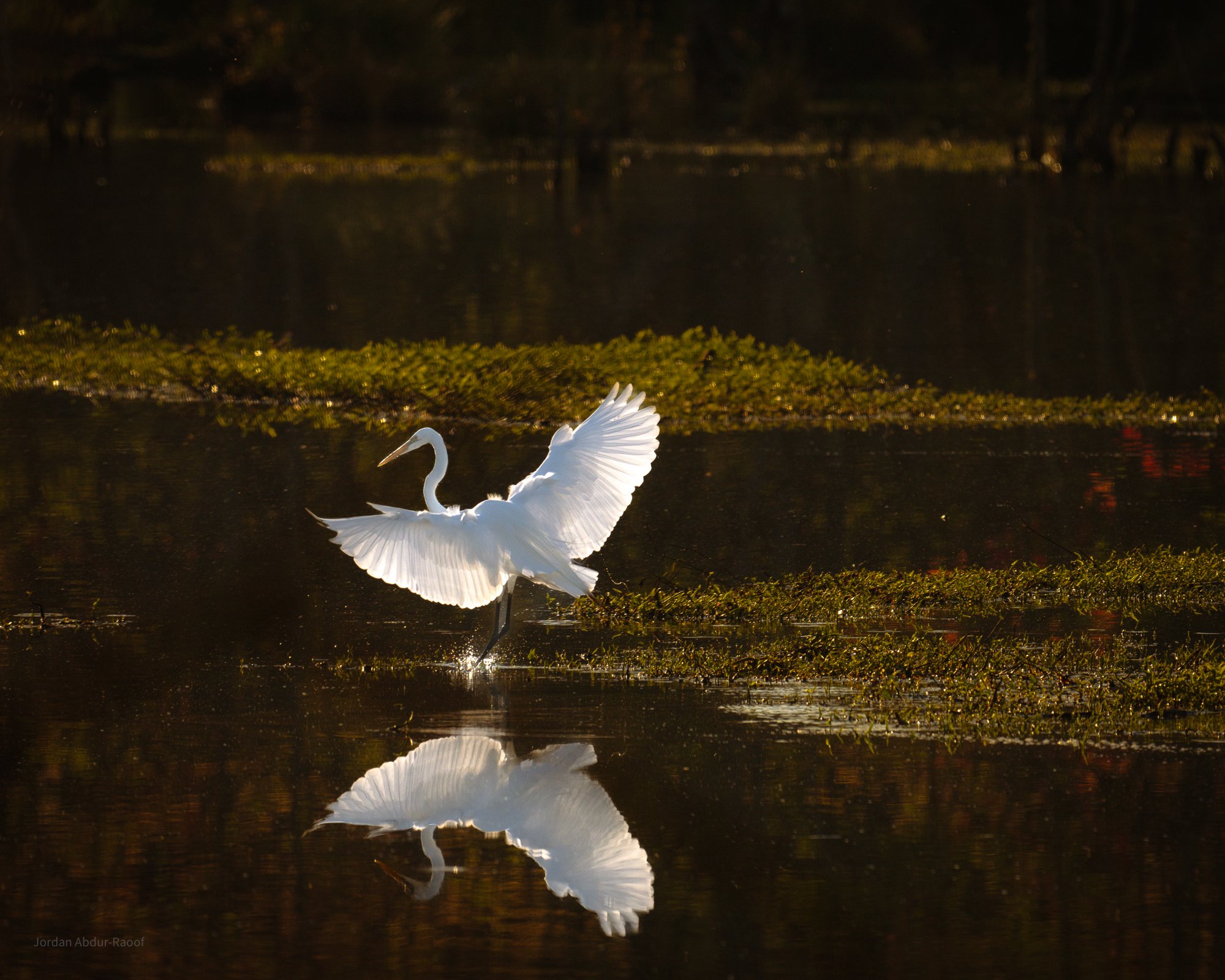
Who We Are
Our Staff
We are powered by a diverse and dedicated staff. Learn more about our current staff and check out any job openings.
Our Board
Our Board has been instrumental in getting us where we are today. Every member believes in the vision of ECWA.
Our vision
ECWA has a rich history, but our vision for the future will is focused on conserving the watershed for generations to come.
Our history
The Ellerbe Creek Watershed has been part of the Durham community for hundreds of years. As we move forward, we remember the history that brought us here.

Our Staff
-
Driven by her commitment to diversity, engagement, and conservation, Nicole is eager to build upon the momentum created in ECWA’s incredible 24-year legacy. Over the last decade, Nicole has dedicated her personal and professional talents toward restoration, ecology, and community engagement with the environment. She began her journey while studying watershed ecosystem management and applied ethics at the University of North Florida. Nicole followed her passions onward into research, shoreline restoration, land management, and environmental education. She discovered her place in nonprofit leadership in watershed restoration efforts through her work with great organizations like the Smithsonian Marine Station, Alachua Conservation Trust, and most recently as the executive director of a waterway cleanup organization in Florida.
Contact Nicole at nicole [at] ellerbecreek.org
-
Growing up exploring the southern shores of Lake Erie in Erie, Pennsylvania, Phil joined ECWA to carry on the promise of keeping access to waterways free to the public for all to explore, enjoy and to spur people's imagination. Phil has 25+ years in operational experience, specializing in local non-profit organizations. He has also worked on over 50 political campaigns within North Carolina and Pennsylvania, usually serving as Treasurer or Senior Advisor.
Careers
-
To hire in Sept 2024
To apply, please send a cover letter and resume to info@ellerbecreek.org. Position open until filled
Position Description:
Please note: This is a Manager level position- experience in Natural Resource Management planning required.
The Land Conservation Manager is responsible for the development and implementation of habitat restoration projects that ensure the sustainable management of all ECWA-owned lands and nature preserves. The Land Conservation Manager supervises the work of the Preserve Stewards Program, comprised of volunteers and any other staff hired to help with conservation and stewardship activities. ECWA’s land holdings include almost 500 acres in and around downtown Durham, NC, including five publicly accessible nature preserves, 4 properties not open to the public, one conservation easement, and any other lands acquired or put under conservation easement by ECWA. The Land Conservation Manager will use the full range of conservation tools, including scientific and engineering practices, advancement of known and new techniques, project management, grant and budget management, and cooperative partnerships to oversee conservation activities at ECWA.
Position Responsibilities:
Plan and direct all aspects of preserve conservation activities including feasibility, project scope, proposals, contracting, design, implementation, management plans, monitoring, maintenance, stewardship, and oversight of internal and external entity collaboration.
Ensure program compliance with internal policies and external requirements, including BMPs and LTA standards.
Ensure conservation practices & strategies are aligned with ECWA’s internal conservation priorities for wetland restoration and preserve stewardship. General preserve and infrastructure maintenance including trails and informational signage (alongside ECWA staff)
Maintaining inventory and functionality of all ECWA Land Conservation equipment, tools, and supplies
Data and reporting responsibilities include: production and submission of baseline documentation reports for new properties and annual monitoring reports for ECWA preserves, data management and grants reporting, GIS mapping, and visual data preparation
Coordination and creation of management plans & relevant conservation & stewardship ECWA policies
Communications and coordination with a wide variety of ECWA staff, private individuals, public entities, community organizations, and contractors in support of ECWA’s programmatic and organizational goals.
Occasional leadership of public hikes and workdays in ECWA preserves, alongside ECWA staff & volunteers
Content creation for public communications, including social media
Financial responsibility may include working within/managing a budget to complete projects, contracting, and assisting with budget development
Writing grants and engaging with funders to develop grant agreements, scopes of work, deliverables, timelines, and budgets for potential projects.
This position will be under minimal supervision, making independent decisions based on analysis, experience and context. Most tasks will be completed independently and require a motivated and task-driven person to complete successfully. May work in variable weather conditions, on difficult and hazardous terrain and under physically demanding circumstances.
This description is not designed to be a complete list of all duties and responsibilities required for this job.
Desired Qualifications:
~ 5 years of direct experience in Natural Resource Management planning & project oversight
Wetland restoration and land conservation skills and experience, including knowledge of wetland science and ecology, and restoration & conservation standards & practices.
Ability to explain conservation and restoration practices to technical and non-technical audiences.
Demonstrated understanding of key ecological processes influencing urban ecosystems in North Carolina, including vegetation ecology, wetlands hydrology, and forest management.
Relevant certifications, courses, or trainings in any of the above fields.
Experience managing grant budgets and fulfilling contract requirements.
Ability to develop, direct, and manage multiple conservation projects; flexibility and responsiveness to unforeseen project demands.
Completing tasks independently with respect to timeline(s).
Excellent communication skills via written, spoken, and visual means, including developing and sharing technical reports.
Ability to analyze, interpret, and synthesize a variety of data, including aerial photography, soil surveys, topographic maps, and GIS & GPS data.
Multilingual skills and multi-cultural or cross-cultural experience appreciated.
Supervisory experience.
Experience using applications such as GIS, Landscape, Google Workspace
Position Details:
This is a full-time position (40 hours per week), classified as salaried/exempt, required to be based out of Durham, NC, with responsibility for managing multiple restoration projects located across multiple properties, requiring travel throughout the watershed. The position requires frequent fieldwork conducted in all weather conditions and variable work hours to supervise project implementation, as well as occasional evening meetings. This position operates under the supervision of ECWA’s Executive Director.
Salary: $60,000
Competitive benefits package includes: 100% employer-covered health insurance, 401(k) plan, parental leave, accrued paid time off, hybrid work schedule, and other life and work well-being benefits. We’re proud to offer a work environment that is supportive of the health and well-being of the people we employ.
ECWA is an Equal Opportunity Employer.
We recognize that our conservation mission is best advanced by the leadership and contributions of people of diverse backgrounds, beliefs, and cultures. Recruiting and mentoring staff to create an inclusive organization that reflects our community is a priority, and we encourage applicants from all cultures, races, colors, religions, sexes, national or regional origins, ages, disability status, sexual orientations, gender identities, military, protected veteran status or any other status. This includes all programs, projects, events, and all other activities sponsored by ECWA. People including but not limited to people of color, women, LGBTQ-identified people, and formerly incarcerated individuals are especially encouraged to apply.
Our Board

Our Vision
-
Beginning with the Parks with Purpose Project, ECWA is taking a deeper look at environmental injustice. We’re committed to representing our entire watershed, including Goose Creek and the neighborhoods of Old North Durham, Albright, East Durham, and Wellons Village. It is our goal to support community members in the Goose Creek areas in their community engagement efforts, acknowledging that flooding and pollution are not simply environmental issues, but often the result of unjust systems of land ownership.
From our humble beginnings over two decades ago at Indian Trail Park, we’ve grown into an organization of hundreds of people working together to heal and protect both our urban streams and the communities around them.
We’re all in this creek together.
-
ECWA's vision is a living creek connecting human and natural communities in Durham. Through land acquisition, collaboration with the city, and public education, we hope to create a Durham where residents can bike or walk across the watershed and stop at local businesses and nature preserves along the way.
To achieve this vision, ECWA will:
Enable a living creek - a healthy stream in which an appropriately diverse group of native fish and invertebrate species thrive.
Create a network of preserves and trails along which people can hike, bike, and walk from the Ellerbe Creek headwaters to Falls Lake.
Build ties among Durham's diverse neighborhoods and communities using Ellerbe Creek as a link
Partner with the City and other groups that seek to move Durham to become a regional model for proactive urban stormwater management.
Help adults, and especially kids, have the opportunity to enjoy and appreciate being outdoors in a learning and safe environment.
-
ECWA’s work started in our founder’s backyard and has evolved to encompass a diverse community of individuals and neighborhoods. Like the water we’re working so hard to protect, our story has a single source, but with dozens of tributaries flowing towards a single goal: a healthy watershed.
Ellerbe Creek Watershed Association was founded in 1999 by Steve Hiltner, a botanist and stay-at-home dad who lived in the Watts-Hillandale neighborhood and frequented Indian Trail Park. On walks with his daughter Sofie, Steve was drawn to a part of the park that straddled Ellerbe Creek, and discovered that many of the plants there were exotic weeds, not the plants and shrubs native to the area. So, Steve got permission to plant native species along the creek.
Having already attended neighborhood board meetings, Steve was impressed by the level of civic engagement in Watts-Hillandale and knew he could count on the goodwill of neighbors to help him heal the creek and strengthen the neighborhood around it. Steve reached out to neighbors—first to a lawyer who helped him apply for 501(c)3 status, then to a fellow dad who helped develop a matching grant application that would help the organization acquire its first six acres of watershed land. In April of 1999, with the help of concerned citizens throughout the community, ECWA was officially born.
Since then, the organization has gone from 6 acres to 450, including five public preserves, and has developed powerful initiatives aimed at restoring the creek, engaging the community in its well being, and advocating for the future health of the watershed.
-
Download by-laws and articles of incorporation. (to be linked later)
Our History
The 37 square miles of land that drain into Ellerbe Creek are known as its watershed. Most of this land is in the heart of Durham, North Carolina.
On early maps, Ellerbe Creek was spelled "Allibay,” a name that some theorized was Native American. After all, the North Carolina Piedmont was once dominated by Sioux-speakers such as the Eno, Occaneechi, Saponi, Sissipahaw, Tutelo, and Shoccoree. However, historian Jean Anderson opines that the Creek is named for the John Ellerby (Allaby) family who, according to The Colonial Records of North Carolina (1886-90), lived on land in what is present-day Durham. Whatever the origin, the creek has carried many names over the years, including Allibay, Allibay’s, Eleby, Ellerbee, Ellerbie, and our (and the state’s!) prefered spelling: Ellerbe.
One of Ellerbe Creek’s earliest mentions comes from Bennett Place, site of the Civil War’s largest troop surrender, which is crossed by Ellerbe feeders. James Bennitt's original deed mentions that his land was on "waters of New Hope Creek and Ellerbe Creek," meaning it was on both sides of the ridge that divides the Neuse and Cape Fear watersheds. Today, the North Carolina Railroad crosses Durham following this ridge. To the north of the tracks, all tributaries, including Ellerbe creek and its feeders, flow past Raleigh, Smithfield, Goldsboro, Kinston, and New Bern into Pamlico Sound. South of the tracks, the tributaries empty into New Hope Creek—eventually flowing into the Atlantic below Southport.
Sadly, pollution is a part of any urban watershed’s history, and Ellerbe is no different in this respect. During the days of the Erwin Cotton Mills, South Ellerbe Creek was channelized and used to dump warm dyes from the mills. In the early days, the entire neighborhood smelled like a laundromat from the hot, soapy water being discharged by the textile mills into South Ellerbe. At the dawn of the new millennium, many of the mill families still in Old West Durham simply called it the "ditch." In more recent years, near the city dump, Ellerbe Creek was channelized, choked with industrial effluent and leachate (which one writer has called "garbage juice").
Along some wooded stretches, Ellerbe's creeks quietly flow through areas as scenic as any in North Carolina. Elsewhere, the Ellerbe has earned a reputation as one of the state's most polluted creeks. Flowing past history and through Durham's neighborhoods, these rivulets, though beloved by many, absorb the city's ills. The goal of the Ellerbe Creek Watershed Association, founded in 1999, is to help citizens live in harmony with this creek, a collaboration that results in clean drinking water and stronger, healthier neighborhoods.
This history was adapted from a historical narrative of Ellerbe Creek by John Schelp. Photos are courtesy of the Old West Durham Neighborhood Association.


















